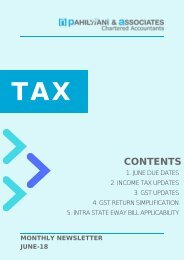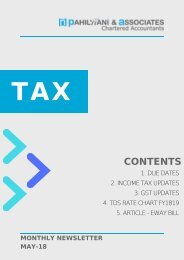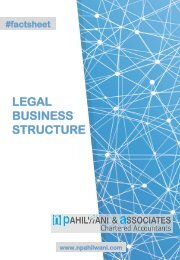TAX-WEEKLY-21-JUNE-N-PAHILWANI-AND-ASSOCIATES
Tax Weekly 21 June N Pahilwani and Associates http://npahilwani.com/tax-weekly-21-june/
Tax Weekly 21 June N Pahilwani and Associates
http://npahilwani.com/tax-weekly-21-june/
Create successful ePaper yourself
Turn your PDF publications into a flip-book with our unique Google optimized e-Paper software.
TAX
WEEKLY NEWSLETTER
21-JUNE-2020
CONTENTS
1. GST UPDATES
2. INCOME TAX UPDATES
1
GST UPDATES
GSTR-1 and GSTR-3B can be filed
through EVC till 30 September 2020 -
CBIC has issued Notification 48/2020-
Central Tax allowing companies to file
GSTR-3B and GSTR-1 returns till 30
September 2020 by verifying them
through EVC.
JUDICIAL UPDATES
Supreme Court stays decision of Delhi
High Court in the case of Brand Equity
Treaties Limited - The Supreme Court
on 19 th June has stayed the operation of
the order of the division bench of Delhi
High Court in the writ petition wherein it
was held that Rule 117(1A) is violative of
Article 14 of Constitution of India being
arbitrary, discriminatory and
unreasonable. Thus, the benefit of
transitioning accumulated credits was
allowed for a period of 3 years from the
date of enactment of the Act, and the
court had directed the Government to
open the common portal to allow
taxpayers claim transitional credits by
filing TRAN-1 till 30 June 2020.
In the past week, there were several
decisions pronounced by placing reliance
on the decision of Supreme Court in the
case of Adfert Technologies Private
Limited and/or decision of Delhi High
Court in the case of Brand Equity Treaties
Limited (which has been stayed now). The
judgements are briefly summarised as
follows:
a. SKH Sheet Metals Components Vs
Union of India &Ors. (Delhi High Court)
The High Court held that the decision
in the case of Brand Equity Treaties
Limited is not entirely resting on the
fact that statute did not prescribe for
any time limit for availing the
transition of the input tax credit. There
are several other grounds and reasons
enumerated in the said decision that
continue to apply with full rigour,
regardless of the amendment to
Section 140 of the CGST Act.
b. Mangla Hoist P. Ltd. Vs Union of
India (Delhi High Court)
Since the judgment in Brand Equity
Treaties Limited has not been stayed
so far, the Revenue is under an
obligation to abide by the directions
c. Amba Industrial Corporation Vs
Union of India &Anr. (Punjab and
Haryana HC)
The High Court directed the Revenue
to accept claim of transition credits till
30 th June 2020, and in event of failure
to do so, granted liberty to the
petitioners to claim credit at the time
of filing GSTR 3B for the month of July
2020.
Supreme Court refuses to intervene in
decision of Delhi High Court allowing
transition credit in an SLP filed by
Union of India - Supreme Court
dismissed SLP filed by Union of India
against the decision of Delhi High Court
allowing transition credit in case of
Chogori India Retails Limited without
going into the question of law. The
Weekly Newsletter
availability of transitional credit to
discharge tax liability in the instant case
was never disputed by the Department.
ADVANCE RULINGS
The question of determining place of
supply does not come under purview
of AAR - Panbase Resources Private
Limited and Shalini Manish Mittal
(AAR Maharashtra) - In two separate
applications for advance ruling which
required determination of place of supply,
the Authority held that the ruling can be
given only for the matters specified in
Section 97(2) of the CGST Act and since
determination of place of supply is not
included therein, it lacks jurisdiction to
pronounce any ruling on the same. The
Authority also relied upon the decisions of
the Appellate Authority for Advance
Rulings in Maharashtra for the same.
These decisions, though reported recently,
were pronounced in February 2020. These
decisions in contrast with the decision of
the Kerala High Court in the case of
Sutherland Mortgage Services Inc
pronounced in March 2020 wherein it was
held that the issue of determining the
place of supply would come within the
ambit of the larger of issue of
determination of liability to pay tax on any
goods or services or both as envisaged in
clause (e) of Sec. 97(2) of the CGST Act.
Goods supplied to an overseas
customer from the premises of
overseas vendor would be subject to
GST- Sterlite Technologies Ltd (AAR
Gujarat) - The Authority held that unless
goods are not crossing the Custom
frontiers of India, the same cannot be
treated as imported into India and would
not be liable to tax. However, the supply
of goods from the place of vendor located
outside India to the customer located
outside India amounts to supply and the
place of supply in such case involving
movement of goods would be the place of
termination for delivery to the recipient in
terms of Section 10.
Thus, the supply of goods to overseas
customer, shipped directly from vendor’s
premises located outside India, would be
liable to GST and cannot be treated as
export.
The ruling needs to be revalidated in light
of provisions under Schedule III of the
CGST Act wherein ‘supply of goods from a
place in the non-taxable territory to
another place in the non-taxable territory
without such goods entering into India’
has been specified neither as supply of
goods or services and hence not liable to
GST.
ITC in respect of hiring of vehicles for
transportation of employees shall not
be available unless such facility is
obligatory - Prasar Bharti
Broadcasting Corporation of India
(AAR Himachal Pradesh) - The ITC as
per the provision of second proviso to
section 17(5)(b) is available only on the
condition that such goods or service or
both are obligatory for an employer to
provide to its employees under any law
for the time being in force. Since, the
applicant has not been able to cite any
law under which the service of providing
the facility of transportation to their
employees is obligatory, the ITC will not
be available on the same.
2
3
Interest is to be considered for the
purpose of calculating aggregate
turnover - Shree Sawai Manoharlal
Rathi (AAR Gujarat) - Interest received
on PPF, personal loans and advances to
family and friends, and on saving bank
account would be considered for the
purpose of calculating the threshold limit
of Rs.20 Lakh for registration under GST
Law.
AAR cannot decide on question which
is already pending before department
- Lear India Engineering LLP (AAR
Maharashtra) - The Authority refused to
admit the application in view of limitation
under Section 98(2) since a SCN was
already issued by the Department on the
question raised in the application.
Weekly Newsletter
INCOME TAX UPDATES
JUDICIAL UPDATES
Section 68 addition merely for
deposit of business receipt of Spouse
in joint bank account unsustainable-
Shri Rajesh Jain Vs ITO (ITAT
Indore) - In the present case, the
assessee maintains a joint bank account
with his wife to deposit the rental income
of the assessee and his wife. The
assessee also submitted that his wife is a
taxpayer having source of income from
Coaching Institute, rental income and
bank interest and regularly files income
tax return. Copy of ITR, Balance sheet
and profit and loss account was also
filed.
The assessee also explained that rental
income of the assessee and his wife is
deposited in this saving account and his
wife is at liberty to withdraw or deposit
from her bank as per her requirement.
On consideration of these facts and
circumstances, ITAT states that it is
wrong to assume that the assessee is
sole owner of funds in the said bank
account. Therefore, ITAT direct the AO to
delete the addition made u/s 68
The usage of the property has to be
considered for section 54F and
several independent residential units
in the same building have to be
treated as one residential unit and
there is no impediment to allowance
of exemption u/s 54F(1)- Navin Jolly
vs. ITO (Karnataka HC).
The usage of the property has to be
considered for determining whether the
property in question is a residential
property or a commercial property. It is
not in dispute that the aforesaid two
apartments are being put to commercial
use and therefore, the aforesaid
apartments cannot be treated as
residential apartments. The contention of
the revenue that the apartments cannot
be taxed on the basis of the usage does
not deserve acceptance in view of
decisions of Kerala, Delhi, Allahabad,
Calcutta and Hyderabad High Courts with
which we respectfully concur.
Alternatively, we hold that assessee even
otherwise is entitled to the benefit of
exemption under Section 54F(1) of the
Act as the assessee owns two
apartments of 500 square feet in same
building and 17 therefore, it has to be
treated as one residential unit. The
aforesaid fact cannot be permitted to act
as impediment to allowance of
exemption under Section 54F(1) of the
Act
The amendment to section 40(a)(ia)
by the Finance (No.2) Act, 2015
w.e.f. 01.04.2015, which restricts
the disallowance for failure to
deduct TDS to 30% of the
expenditure instead of 100%, is
curative in nature and should be
applied retrospectively - Muradul
Haque vs. ITO (ITAT Delhi)- Various
benches of the Tribunals including the
Delhi Benches of the Tribunal, have held
the amendment made by Finance (No 2)
Act to be curative in nature. We further
finds the coordinate bench of the
Tribunal in the case of R.H. International
Vs. ITO (supra) has held that
4
5
disallowance u/s. 40(a)(ia) of the Act be
restricted to 30% of the expenses paid
as against 100% because amended
provision is curative in nature and the
provisions should be applied
retrospectively
Under CBDT Instruction No.5/2016,
a case earmarked for 'Limited
Scrutiny' cannot be taken for
'Complete Scrutiny' unless the AO
forms a "reasonable view" that there
is a possibility of under assessment
of income - Dev Milk Foods Pvt. Ltd
vs. Addl CIT (ITAT Delhi)- There is not
an iota of any cogent material mentioned
by the Assessing Officer which enabled
him to have reached the conclusion that
this case was a fit case for conversion
from limited scrutiny to complete
scrutiny. it is very much clear that no
reasonable view is formed as mandated
in the said CBDT Instruction No.5/2016
in an objective manner and secondly
merely suspicion and inference is the
foundation of the view of the Assessing
Officer.
We also note that there is no direct
nexus brought on record by the
Assessing Officer in the said proposal
and, therefore, it is very much apparent
that the proposal of converting the
limited scrutiny to complete scrutiny was
merely aimed at making fishing
enquiries.
Email: info@npahilwani.com
Web: www.npahilwani.com
Disclaimer
Every effort has been made to avoid errors or omissions in this material. In spite of this, errors may creep in. Any mistake, error
or discrepancy noted may be brought to our notice which shall be taken care of in the next edition. It is notified that neither the
publisher nor the author or seller will be responsible for any damage or loss of action to any one, of any kind, in any manner,
there from. It is suggested that to avoid any doubt, the reader should cross-check all the facts, law and contents of the publication
with original Government publication or notifications. No one should act on such information without appropriate professional
advice after a thorough examination of the particular situation.
Weekly Newsletter











